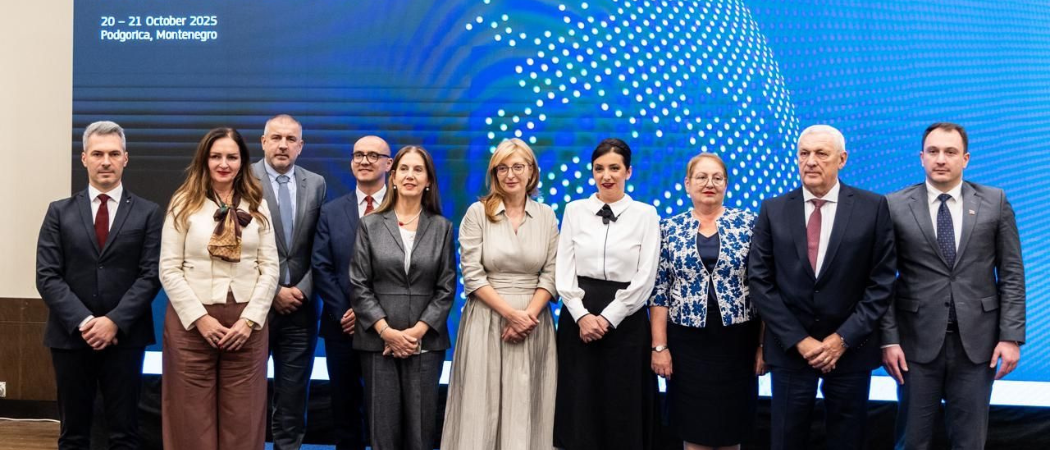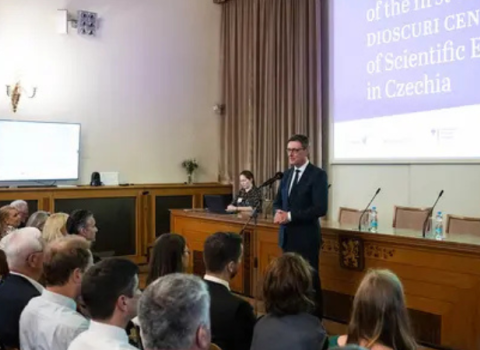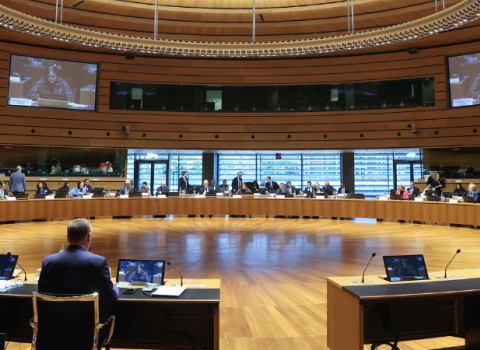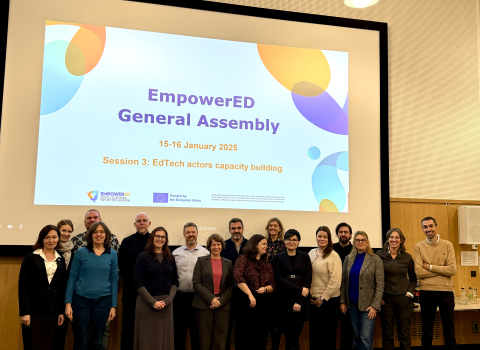Barriers remain in the European Research Area, amid a new push to further integrate the Western Balkans

EU research Commissioner Ekaterina Zaharieva at the Western Balkans ministerial meeting in Podgorica. Photo credits: European Union
Countries in the Western Balkans want to better align their research policies with EU initiatives, including through the upcoming European Research Area (ERA) Act, following a ministerial meeting in Podgorica this week.
The nine EU candidate countries, most of which are located in the Western Balkans, are associated with Horizon Europe, the funding backbone of ERA, a policy initiative dating back to 2000 that aims to create a European single market for science.
But a lack of policy alignment in these candidate countries and the voluntary nature of ERA have so far put a brake on its full implementation in the region. Commentators say there are other obstacles, harder to tackle through agreements, that may continue to prevent full integration.
However, EU research Commissioner Ekaterina Zaharieva was more optimistic after meeting with Western Balkans ministers in Podgorica on October 20-21, where they committed to further align their R&D policies with the EU. “We are setting the stage for a new era of collaboration,” Zaharieva said after the meeting.
With the ERA, the Commission hopes to deepen Europe’s market for knowledge and coordinate research and innovation investments and reforms across Europe. Policymakers in Brussels say ERA should also address inequalities in research and innovation performance.
The upcoming ERA Act, which Zaharieva plans to present in 2026, aims to consolidate the research market through legally binding obligations rather than voluntary commitments from member states. There are also likely to be incentives for governments to reach the target of spending 3% of GDP on research and innovation, for example.
Spending is a distinct problem for the Western Balkans, where low national support makes it hard for universities to invest in infrastructure or equipment that are up to EU norms. In Albania, for example, "despite rhetorical support for research and innovation, public funding remains very low," said Anila Paparisto, vice-rector of the University of Tirana.
Varied mindsets
But less intangible barriers, such as differences in academic culture in the candidate countries, also play a role. “You may have researchers who are very well integrated in their universities, but may not be so dedicated to research as in Western Europe,” said Sorin Costreie, president of the Network of Universities from the Capitals of Europe, whose membership includes institutions from the candidate countries.
An absence of common ground goes both ways. “Western Europe researchers may ask themselves: why should we share our resources? This mentality must be changed as well.”
Paparisto also sees Western partners hesitate when they perceive administrative or technical limitations in less seasoned organisations.
“We are not yet widely recognised across Europe,” she said of Albanian research institutions. “There’s a risk of being seen as junior partners or quota-fillers rather than equal contributors, especially in competitive research fields.”
Barriers also include the politicisation of universities in candidate countries, where rectors are more often prominent political figures than in the west, and systemic corruption in certain regions.
Yet, Costreie fully endorses bringing candidate countries closer to ERA. “I see only good things,” he said. It will mean a better social and political integration, and universities will be quicker to adapt once the accession process is accomplished, he went on.
Related articles
- Zaharieva plans ‘ambitious but realistic’ ERA Act
- Serbia’s academics call for research chapter in EU accession process to be reopened
In collaborative work, building trust doesn’t happen overnight and finding partners is a shared obstacle across the board. Participating in conferences, especially in person, helps to build a network, but funding the travel and other expenses can be a barrier.
“Many researchers in Albanian universities lack long-standing connections with colleagues abroad,” Paparisto said. At the same time, many of these researchers are moving abroad seeking better opportunities.
On the one hand, the country loses human capital, but on the other, Albanian researchers abroad help build the bridges the research community back home needs.
Beyond Western Balkans
Ukrainian researchers also struggle to find partners, while witnessing a brain drain in academia. Since the full-scale Russian invasion in 2022, 30% of Ukraine’s research institutions have been destroyed, especially close to the frontlines. Rebuilding the infrastructure lost so far could cost around €1.2 billion, according to the Ukrainian government.
For the researchers who have stayed in Ukraine, the EU science market is a chance to either progress in their careers or to leave, as 20% of Ukrainian researchers have done already. But the perceptions of potential Western partners can be a challenge.
“Some European partners [. . .] are afraid that Ukrainian participants are so affected by the war that they will not be good partners, that they will not be able to carry out the activities they should under the grant,” said Oleksandr Moiseiev from the Horizon Europe Office in Ukraine.
Overall, Costreie compares these complex and uncertain relations to a "foggy bridge" where researchers from western Europe stand on one side and those from EU candidate countries on the other, and neither can see the other clearly.
But fog can lift when the air warms. "What's important is to find certainty in this fog and strengthen cooperation," he said.





 A unique international forum for public research organisations and companies to connect their external engagement with strategic interests around their R&D system.
A unique international forum for public research organisations and companies to connect their external engagement with strategic interests around their R&D system.